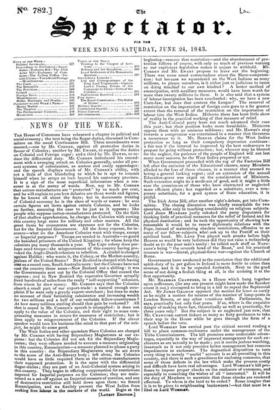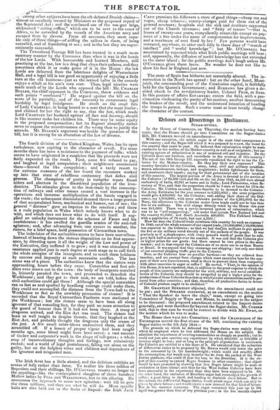NEWS OF THE WEEK.
Tni House of Commons have rehearsed a chapter in political and social economy ; the text being the Sugar-duties, discussed in Com- Tni House of Commons have rehearsed a chapter in political and social economy ; the text being the Sugar-duties, discussed in Com-
mittee on the usual Continuance Bill. Three amendments were mooted,—one by Mr. COBDEN, against all protective duties in favour of Colonies ; another by Mr. EWART, to equalize the duties on Colonial and Foreign sugar ; and a third by Mr. Hewes, to re- duce the differential duty. Mr. COBDEN introduced his amend- ment with a sweeping attack on Colonies generally, under all pre- sent systems of colonization; as useless and costly appendages: and the speech displays much of Mr. COBDEN'S ability, with not a little of that blundering to which he is apt to commit 'himself when he strays an inch beyond his customary province. It is a sign of the most superficial information when a rea- soner is at the mercy of words. Now, say to Mr. COBDEN that cotton-manufactures are " protected" by so much per cent, and he will explain to you how delusive are those words and figures, for he knows all about the facts; but in documents treating of Colonial economy he is the slave of words or names : he sees certain figures set down against certain Colonies, and he looks po further, assuming the case to be just as it appears ; like people who suppose cotton-manufactures protected. On the faith of that shallow apprehension, he charges the Colonies with costing this country large sums for military and other matters. All the great items he enumerates are expenses not for the Colonies, but for the Imperial Government. All the Army expense, for in- stance—what do the American Colonies want with troops, except ;or Imperial purposes ? Troops are needed in Australia—to guard the banished prisoners of the United Kingdom ; for whose keep the colonists pay many thousands a year. The Cape colony does per- haps need troops—the misgovernment of this country having pro- voked the Anglo-Dutch colonists to rebellion. A citadel is charged against Halifax : who wants it, the Colony, or the Mother-country, *ions of the United States ? New Zealand is charged with having chat us a round sum, South Australia more : but the Colonies have not cost the country those sums—New Zealand not a shilling : it was the Governments sent out by the Colonial Office that caused the expense ; and in New Zealand the expensive Governor actually lived hundreds of miles from the really " self-supporting" colonists, from whom he drew money. Mr. COBDEN says that the Colonies absorb a small part of our export-trade : a natural enough com- plaint of he were only a greedy export-merchant ; but does he make no account of their furnishing subsistence and increasing wealth for two millions end a half of our veritable fellow-countrymen ? At how many millions sterling should that gain be reckoned ? All that is sound in Mr. COBDEN'S speech is misapplied : it does not apply to the value of the Colonies, and their right to some com- pensating measures in return for measures of restriction; but it does apply to misgovernment of the Colonies. If the clever speaker would turn his business-like mind to that part of the sub- ject, he might do some good. The West Indies and other quondam Slave Colonies are charged by Mr. COBDEN with having Stipendiary Magistrates at our ex- pense: but the Colonies did not ask for the Stipendiary Magis- trates;• they were officers needed to execute a measure originating ui this country, Emancipation—a measure planned to please a party in this country : the Stipendiary Magistrates may be set down to the score of the Anti-Slavery body ; left alone, the Colonies would have as little required them as the cotton-manufacturers their supposed protection. It is the same with the differential Sugar-duties ; they are part of an Anti-Colonial system arising in this country. They began in offering compensation for restrictions imposed for Imperial purposes on the Colonies; they are main- tained as a set-off against an Imperial measure of coercion, and one of destructive restriction still held down upon them: we forced Emancipation, and we forcibly prevent the West Indies from seeking free; labeur ie the markets of the world. Begin at the
beginning—remove that restriction—and the abandonment of pro- tection follows of course, with only so much of previous warning as our capricious legislation makes it unjust to withhold. Mr.
COBDEN and Mr. EWAaT propose to leave out the beginning. There was some usual commonplace about the Slave-compensa- tion: but because we squandered on the West Indians so many
millions, to please ourselves, is it either just or judicious to insist on doing mischief to our own kindred ? A better method of emancipation, with auxiliary measures, would have been worth far more than twenty millions to them. It is also said that a system of labour-immigration has been vouchsafed : why, we have a new Corn-law, but does that content the League ? The removal of restriction on the importation of foreign corn goes to a far greater extent than the removal of the restriction on the importation of labour into the West Indies. Hitherto there has been little show of reality in the practical working of that measure of relief.
The Anti-Colonial party have not much advanced their case this year ; but their position looks more formidable. Ministers oppose them with an ominous mildness ; and Mr. Hewss's step towards a compromise was entertained in a manner that threatens a recurrence to it. Mr. BERNAL claims for the West Indies protection so lung as their compulsory depression continues : a fair test if the interval be improved by the best endeavours to prepare for going without protection ; but, whoever may be blamed for the neglect, the patience of the people of England will not last many more seasons, be the West Indies prepared or not. When Government proceeded with the rag of the Factories Bill left after the omission of the Educational clauses, many Members alluded to the loss of those clauses, in a manner that seemed to betray a general lurking regret ; and an extension of the annual Education-grant was urged on the consideration of Ministers. Such extension might do a modicum of good, and it might a little ease the consciences of those who have obstructed or neglected more efficient plans; but regarded as a substitute, even a tem- porary substitute, for a good system of State education, it is pitiful. The Irish Arms Bill, after another night's debate, got into Com- mittee. The closing discussion was chiefly remarkable for two speeches, alike only in touching considerably on religious subjects. Lord JOHN MANNERS justly rebuked the party disputants for thinking little of practical measures for the relief of Ireland and its physical destitution; and he took the opportunity of showing how reasonable it would be to renew diplomatic relations with the Pope, instead of maintaining obsolete restrictions, offensive to so many of our fellow-subjects, who' ook up to the Pontiff as their spiritual head. Mr. Lens Fox played such pranks before high Heaven as would be very ludicrous did they not raise a melancholy doubt as to the poor man's sanity : he talked such stuff as NAPO- LEON 'S being " the seventh head of the Beast," and his practical measure is war—literal, physical-force war—against the Church of Rome.
Government have awakened to the conviction that the additional spirit-duty of ls. per gallon in Ireland is more fertile in crime than revenue, and it is to be repealed forthwith. Next to the good sense of not doing a foolish thing at all, is the undoing it at the first opportunity.
Mr. SHARMAN CRAWFORD, in a House which hung together upon sufferance, (for any one present might have made the Speaker count it out,) attempted to bring in a bill to repeal the Septennial Act. Sir JAMES GRAHAM opposed the motion for leave as curtly as he might a motion for returns of the number of lamp-posts in London Streets, or any other vexatious trifle. Parliaments, he says, practically last only four years. If so, where is the exquisite danger of making them last, theoretically as well as practically, for three years only ? But the subject is so neglected just now, that Mr. CRAWFORD cannot induce so many as forty gentlemen to take their nap in the House while he goes through the form of a speech before the vote.
Lord WORSLEY has carried past the critical second reading a bill to place common-enclosures under the management of the Tithe Commissioners. The bill promises some undeniable advan- tages, especially in the way of improved management for such en- closures as are actually to be made ; yet it merits jealous watching, inasmuch as it not only provides better management but removes impediments to enclosure. The dogmatical disposition to turn every thing to merely " useful " account is so all-prevailing in this country, and there is such a greediness for enclosing commons, that some of those defects in the law which make the process costly and difficult have been real advantages. Lord Wouster's bill pro- fesses to impose proper checks on the enclosure of commons, and especially in consulting the wishes of all " interested." It will be the duty of Members to ascertain that those checks are rendered effectuaL To whom is the land to be ceded P Some imagine that it is to be given to neighbouring landowners !—but that must be a libel on Lord Woman
..mong other subjects have been the oft-debated Danish claims- • almost as cavalierly treated by Ministers as the proposed repeal of
410' the Septennial Act ; and the continued use of the ten-gun brigs, nicknamed " sailing coffins," which are to be sent to the coast of Africa, to be outsailed by the vessels of the American navy and escaped from by slavers. From all accounts, they seem capa- ble only of three things—of stifling the sailors in them, of being outsailed, and of foundering at sea ; and in the last they are super- eminently successful.
The Townshend Peerage Bill has been treated in a much more summary manner by the Commons than when it was in the hands of the law Lords. With honourable and Yearned Members, still practising at the bar, law is a drug that cloys their palates, and they sometimes shirk it or make game of it in the House : the law Lords are debarred from the laborious delights of Westminster Hall, and a legal bill is too good an opportunity of enjoying a little turn at the old business—just as the retired tailor in the comedy enjoys a stitch at his son's torn coat. Thus, legal niceties were made much of by the Lords who opposed the bill : Mr. CHARLES BULLER, the chief opponent in the Commons, threw evidence and such points " overboard"! He argued against the bill on the score of its partiality, and of the necessity to compensate legal hardship by legal indulgence. He dwelt on the cruel fate of Lady CLIARTLEY, in being bound to a man that she must loathe ; and claimed for her the right to say, that the law, which made Lord CHARTLET her husband against all fact and decency, should in like manner make her children his. There may be some equity in the proposed compensation ; but its flagrant absurdity rather acres to expose the monstrousness of the wrong than to justify the amends. Mr. BULLER'S argument was beside the question of the bill, but it is strong for an alteration of the law of divorce.



























